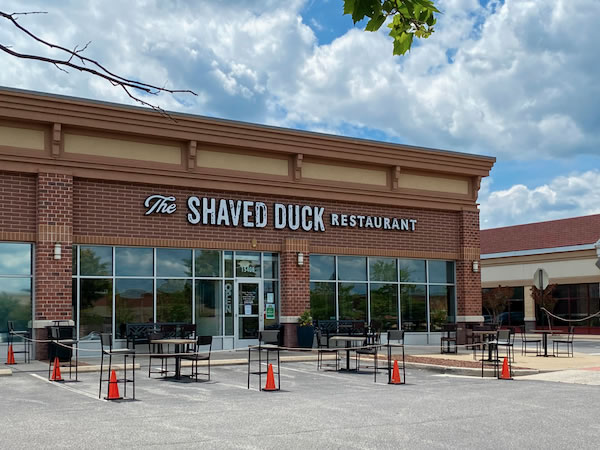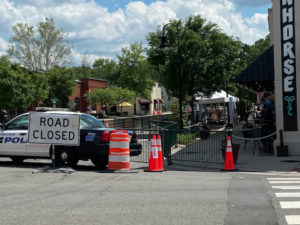
The Shaved Duck is among the restaurants that have taken advantage of Chesterfield County’s relaxed rules on outdoor dining. The restaurant has created a new patio space to serve diners outdoors. Courtesy Chesterfield County.
With outdoor dining back on the menu and more vital for business than ever, local restaurants are cooking up ways to take advantage of loosened guidelines with the help of new local government programs.
For some, particularly restaurants in the counties, expanding outdoor seating has been a process of improvisation and creating new workflows to balance safety and operations.
For the Shaved Duck, a restaurant at 15408 WC Commons Way in Midlothian, the ability to expand outdoor dining was a welcome boost to business in the age of the coronavirus but presented some logistical challenges. That’s because it didn’t have outdoor seating at all until a couple weeks ago.
“We’ve created our own makeshift patio,” said Lauren Wrenn, the restaurant’s marketing director. “The response we have gotten makes it clear people were going a little stir crazy.”
The restaurant took advantage of Chesterfield County’s “Let’s Take it Outside, Chesterfield” program, a web-based tool launched May 15 offering online applications to streamline approvals for temporary outdoor dining permission.
Chesterfield’s program is one of several similar initiatives offered by localities in the region and made possible by reopening rules put in place last month by Gov. Ralph Northam allowing restaurants to reopen outdoor seating areas at 50 percent capacity, and loosening restrictions, and where and how outdoor patios can be set up.
Restaurants in most of the region have had a few weeks with outdoor dining in play, as they joined the state in kicking off phase one May 15. The city of Richmond entered phase one May 29, being among a small number of localities that delayed their reopening. Phase two, which Richmond has yet to enter, kicked off for most of the state last week. In phase two, restaurants can reopen indoor spaces at 50 percent occupancy.
Restaurants that had all the paperwork for outdoor dining prior to the pandemic don’t need special permits to open outdoor seating, though they’re still bound by state reopening guidelines such as six feet between tables and other rules intended to minimize the ability of coronavirus to spread.
Working within the rules, Shaved Duck has roped off a section of its sidewalk and adjacent parking lot space, setting up two to four tables each day.
While it has the ability to put out up to 10 tables, Wrenn said her crew has kept costs low by moving some of their indoor furniture in and out each day. They also keep an eye on the weather, both because it hampers peoples’ appetites to eat outside and could ruin the furniture.
The restaurant limits parties to four people or fewer, and uses disposable menus, takeout boxes and utensils.
“Everything you touch, you throw out,” Wrenn said.
Ashland, Henrico and others change on the fly

Ashland has closed off some roads to give restaurants additional space to spread out their outdoor dining areas. Courtesy Ashland.
In Ashland, town officials have helped restaurants maximize their outdoor space by closing off streets under the Parking to Patio initiative, allowing restaurants to use street space in addition to sidewalks and parking spaces to set up tables.
The Caboose Market and Cafe, located near the corner of South Railroad Avenue and Thompson Street, has temporarily occupied sidewalk space to expand its outdoor seating from three tables to five, owner Ian Kirkland said.
Since opening the new area last month, Kirkland said response has been positive. The restaurant is doing dinner-only and reservation-only for sit-down patrons, though it could introduce lunch service in the future. Food is served with disposable utensils and dishes, and ordered from disposable menus, Kirkland said.
“We’re easing into this,” he said.
Kirkland said while government officials have been responsive in getting things on the road, there’s been a process of figuring out how to balance the restaurant’s outdoor seating with state and local rules.
“It’s a little bit of the wild, wild West to decipher what’s coming down (from the state),” he said.
Iron Horse, a restaurant just a few doors away, likewise has expanded its patio space and now occupies part of the street adjacent to it, General Manager Rusty Stone said.
The restaurant has increased its seating area from four tables to around 12. Reservations are preferred, and the day’s reservation count helps determine how many tables are put out with respect to distancing guidelines.
“Family and friends are just starting to get back together,” Stone said, adding that while most reservations are for pairs, he’s noticed a trend toward larger groups of four to six people.
“It’s been a great response. It’s still got a ways to go,” he said.
Ashland doesn’t use an application process for the Parking to Patio initiative, due to the variety of different factors and considerations possible for a given business. Businesses can contact the town planning department to begin discussions with town staff about how to utilize street space for tables.
“The town is working with our restaurants and state agency partners to authorize adjustments to the layout, and in some cases the size, of the patios on a case-by-case basis in an effort to support our businesses’ safe operations,” Matt Reynal, Ashland assistant town manager, said in an email.
The town temporarily has closed the southbound portion of South Railroad Avenue, from Thompson Street to the municipal parking lot. The town also has temporarily closed a block of Lee Street from northbound South Railroad Avenue to the town library’s parking lot.
Ashland isn’t alone in expanding where restaurants can set up tables. In the city of Richmond, restaurants can apply for a temporary permit to encroach on public right-of-way to create or expand outdoor seating. On May 28, Petersburg closed part of Sycamore Street in the Old Towne area to allow restaurants there to increase their outdoor seating.
Hanover County created a specific task force of staff from departments involved in the outdoor seating permitting process to focus on applications as they come in, allowing permits to be approved more quickly.
“The key is having those people in each department responsive to each request,” said Richard Gordon, the county’s chief building official.
In Henrico, the county’s economic development authority has resolved to cover the permit costs for structures related to the creation of temporary outdoor dining areas.
“It’s as simple as that. We want to make this easy,” EDA Executive Director Anthony Romanello said. “The hospitality sector was really hammered by this coronavirus pandemic.”
Depending on the permit fees involved, outdoor dining areas can cost a restaurant $400 at most. The county doesn’t have a specific budget for the program because it doesn’t expect there will be high demand, Romanello said.
“The ones we’re seeing are putting up good-sized tents,” he said. “We want people to open their restaurants and we’re doing the best we can to help them.”
"local" - Google News
June 09, 2020 at 05:05PM
https://ift.tt/3dNuMXI
Local restaurants improvise with loosened outdoor seating rules - RichmondBizSense
"local" - Google News
https://ift.tt/2WoMCc3
https://ift.tt/2KVQLik
Bagikan Berita Ini














0 Response to "Local restaurants improvise with loosened outdoor seating rules - RichmondBizSense"
Post a Comment